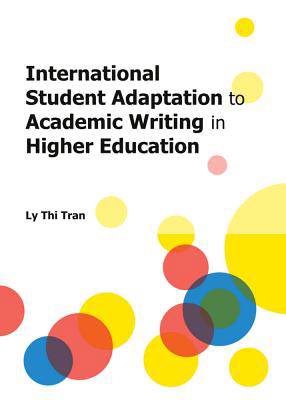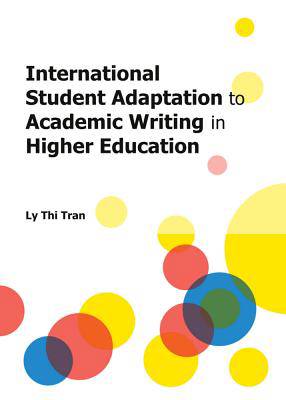
- Retrait gratuit dans votre magasin Club
- 7.000.000 titres dans notre catalogue
- Payer en toute sécurité
- Toujours un magasin près de chez vous
- Retrait gratuit dans votre magasin Club
- 7.000.0000 titres dans notre catalogue
- Payer en toute sécurité
- Toujours un magasin près de chez vous
International Student Adaptation to Academic Writing in Higher Education
Ly Thi Tran
Livre relié | Anglais
115,45 €
+ 230 points
Description
Academic writing is a key practice in higher education and central to international students' academic success in the country of education. International Student Adaptation to Academic Writing in Higher Education addresses the prominent forms of adaptation emerging from international students' journey to mediate between disciplinary practices, cultural norms and personal desires in meaning making. It introduces new concepts that present different patterns of international student adaptation including surface adaptation, committed adaptation, reverse adaptation and hybrid adaptation. Drawing on these concepts of adaptation, this book provides readers with new and deeper insights into the complex nature of international students' adjustment to host institutions. It works through many unresolved issues related to cross-border students' intellectual, cultural, linguistic and personal negotiations. This book presents a trans-disciplinary framework for conceptualising international students' and lecturers' practices within the institutional structure. This framework has been developed by drawing on a modified version of Lillis' heuristic of talk around text and positioning theory. The framework enables an exploration of not only the reasons underpinning international students' specific ways of meaning making, but also their potential choices in constructing knowledge. A distinctive contribution of the book is the development of a dialogical pedagogic model for mutual adaptation between international students and academics rather than the onus being on exclusive adaptation from the students. Existing research on international education indicates the significance of reciprocal adaptation between international students and academics. Yet very little has been done to conceptualise what mutual adaptation means and what is involved in this process. The dialogical model introduced in this book offers concrete steps towards developing reciprocal adaptation of international students and academics within the overarching institutional realities of the university. It can be used as a tool to enhance the education of international students in this increasingly internationalised environment. This book is a significant contribution to the field of international education. It takes a critical stance on contemporary views of globally mobile students. The insights into international students' voices, hidden intentions and their potential choices in meaning making presented in this book will attract dialogues about the critical issues related to inclusive practices, internationalised curriculum and institutional responses to the diverse needs of international students.
Spécifications
Parties prenantes
- Auteur(s) :
- Editeur:
Contenu
- Nombre de pages :
- 180
- Langue:
- Anglais
Caractéristiques
- EAN:
- 9781443848336
- Date de parution :
- 01-11-13
- Format:
- Livre relié
- Format numérique:
- Genaaid
- Dimensions :
- 150 mm x 208 mm
- Poids :
- 340 g

Les avis
Nous publions uniquement les avis qui respectent les conditions requises. Consultez nos conditions pour les avis.






